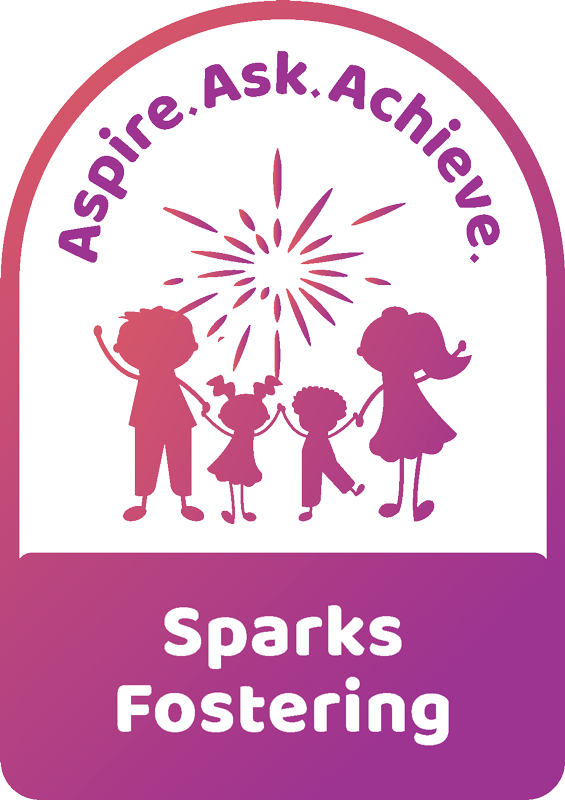Record keeping, Communication and Confidentiality
Keeping Records
Sparks Fostering has electronic folders containing relevant information for each member of staff (and applicant), foster carers (and applicants), and residents placed with carers (or referred to carers, or previously placed with carers).
Sparks Fostering email accounts are considered to be an extension of Sparks Fostering software and electronic file storage. Email accounts are secure and access to each account is by the account holder and (when necessary for review) by line managers.
All information is stored securely on software used by Sparks Fostering.

Types of recordings
Foster carers and staff are expected to update records when there are any changes or progress made, which includes activities, behaviour and progress for the child, any relevant phone calls, emails and discussions and any other updates about the child, foster carer, or staff.
The types of written recordings include:
- Records: These provide a summary of the resident, fostering family or staff members. Anyone who has access to the file should be able to get a thorough overview by reading the records. Training records track which mandatory and non-mandatory training has been completed.
- Journals: A journal is recorded with (or on behalf of) the resident and will be useful for the resident to reflect on when they move on from the fostering home.
- ‘Actions’: Communications such as emails, phone calls, and incidents should be recorded as ‘Actions’. Significant events (such as safeguarding issues, milestones and medical problems) should be marked as such, so that a ‘chronology’ of significant events can be created when it is required.
Photographs and video recordings
Video or audio recordings (including recordings with mobile phones, or virtual/online calls) can only be carried out after consultation with line managers, the resident, the resident’s social worker and with the consent of anyone involved. If consent is withdrawn at any time, the recordings must be deleted (written records may need to be produced before deleting the recordings). It should be noted that some people may refuse recordings or pictures of themselves or their children because of their religious beliefs.
Recordings of children who are fostered should never be shared on social media, namely because there would be a risk to the child of being identified by their family. Children may choose to put their own pictures on social media – when this happens, the children’s social worker should be notified and the foster carer should speak with the child about the risks of internet use (see Sparks policy ‘Online and mobile phone safety’).
Any images, videos or other confidential information taken of the children should be stored in a password protected (or locked) location, unless consent is provided for otherwise.
CCTV and recording in the home
If CCTV or home recording is used, all residents and visitors to the home should be made aware. Recordings should not be stored permanently and if a recording is downloaded (e.g. for security purposes), it must be deleted after it has served its purpose.
Cameras in the home cannot be used in bedrooms or bathrooms and should be turned off when appropriate adults are home. When home cameras or CCTV are used, information about their use should be recorded in the family safer care policy.
CCTV or and other records should be compliant with the guidance provided by the Information Commissioner’s Office – click here for further information.
Quality of records
It is crucial to the success of Sparks Fostering (and for the benefit of the children in our care) that records are updated regularly and maintained to a high standard.
Entries in records, decisions and reasons for them, should always be legible, clearly expressed, non-stigmatising, distinguish between fact, opinion and third party information and are signed and dated.
Resident’s records should be written in a way that can be understood by the resident, or the record are to be explained to the resident.
Everyone should be encouraged to review their own records and contribute to it if they wish to.
Management oversight and any other decision making processes should also be made clear on records.
Storage of information
Sparks Fostering is a paper-free organisation: This means that all information is either inputted directly onto the software used by the agency, or is scanned and uploaded.
Any edits to documents should also be stored securely on the staff or foster carer devices, so that the information can be recovered in the unlikely event that information is changed or removed from the software.
Devices containing information (and any hard copies) must be stored safely. Devices must be password protected and passwords should not be shared with others. If items are transported, they must never be left unattended. If items are left in a vehicle, they must be left in locked boots and not visible to others.
If foster carers or staff wish to keep hard copies of information, such as print-outs or notes taken at meetings, they must have lockable storage within the home where the information can be stored. Confidential information should not be left unattended when it is not in lockable storage.
Any electronic information which is printed out must be disposed of securely as soon as the document has served it’s purpose; for example, panel members who wish to print fostering assessments must destroy hard copies of the assessments (and any other shared paperwork) immediately after panel.
The Safeguarding Lead must be notified immediately if any information is misplaced or stolen.
Retention
Records about the children we care for are kept for at least 15 years from when the placement ends.
Records for approved foster carers and staff are stored for at least 10 years from the date on which their approval or employment is terminated.
Records about fostering and staff applicants (who were not ultimately approved/employed) are kept for at least 3 years from the refusal or withdrawal, as the case may be, of the application to become a foster parent or staff member.
It is a legal requirement for the foster carer and child records to be kept for these times. If a request is received to delete records after this time, they would be deleted if it is determined that deleting the records would not compromise the safety or welfare of others.

contact With press and media
Foster carers and staff aren’t permitted to have any contact with media or press without the consent and involvement of the Registered Manager.
When press work is agreed, it would be with the support and oversight of the registered manager.
Confidential information
Information is shared on a ‘need to know’ basis. This means that Sparks Fostering shares all information we have about the children we care for with the foster carers (except during investigation into an allegation against foster carers). The foster carers must use their discretion to decide how much information to share with others: An example is that if the child wants school friends to think that the foster carer is a family member, the foster carer should respect the child’s approach. However, other residents in the home and backup carers need to know the child’s needs and how to meet those needs, so the foster carer has to determine how much information has to be shared for the child’s needs to be met. When foster carers are unsure about how much information they can share, they should discuss this with their supervising social worker.
Some information is stored on ‘confidential’ files, such as references and ongoing complaints/allegations.
Breaches of confidential information are a serious breach of trust and may lead to disciplinary action.
DBS information
Enhanced DBS checks are completed for all foster carers, staff (including panel members) and residents of the fostering home (and backup carer’s home) who are over 18 years old. Due to the sensitive nature of DBS information, the DBS certificate is not stored on our records.
Sparks Fostering asks all DBS holders to register on the update service (which has to be done within 28 days of the DBS certificate being issued – click here for further information). Sparks Fostering stores the DBS certificate number so that checks can be repeated at least every 3 years.
If the DBS (or other checks) are not clear, a risk assessment is completed to determine if the information impacts on the subject’s ability to safeguard children and work effectively with Sparks Fostering. The risk assessment is stored on the subject’s file. The only people who have access to the file are those who need to know details of the risk assessment.
Sharing to safeguard children
Records are shared with professionals when it is believed that it is necessary to safeguard others. For example, the ‘Local Authority Designated Officer’ may be informed about allegations against staff or foster carers. The ‘team around the child’ (including health, education, independent reviewing officers) are provided a copy of the child’s record if it is required. The social worker and managers will make a decision about how much information needs to be shared in order to safeguard whoever is at risk and who the information has to be shared with.
Children cannot be assured absolute confidentiality or secrecy for any of the information that they share with others, because if the child shares information which impacts on their safety or well-being, the information has to be shared with the other members of the team around the child, who can work together to keep the child safe and provide best levels of care.
Sharing the children’s records with children
Information about the child is recorded clearly and in a way which will be helpful to the child when they access their files now or in the future.
Children are actively encouraged to read their files, other than necessarily confidential or third party information. Children should be encouraged to correct errors and add personal statements.
Foster carers must understand the important supporting role they play in encouraging the child to reflect on and understand their history. The child, subject to age and understanding, is encouraged to keep appropriate memorabilia (including photographs) of their time in the fostering home. Foster carers must record, and help children make a record of significant life events (subject to age and understanding).
If a child wishes to access their records, they are given access within 20 days of their request to the Sparks Fostering Registered Manager.

Sharing foster carer or social worker records
Foster carers and staff members (including panel members) have a right to access their own information.
Social workers should be mindful that foster carer records should be readily understandable by the foster carers. The language style should be easy for most people to understand.
If a foster carer or staff member wishes to access their records, they will be given access within 20 days of their request to the Registered Manager.
Sharing foster carer records with panel members
Panel members have access to full file information about the foster carers (other than confidential information). Panel members are not given identifying information about the children being cared for; first names only are used to refer to children within the foster carer records.
Sharing with the children’s social worker
The children’s social worker leads the work of the team around the child, so it is crucial that the children’s social worker is informed of any updates about the child. Records about the children are shared readily with the children’s social worker.
Children’s social workers should be informed immediately about any significant developments about the children we care for.
If the local authority children’s social worker makes a written request for information about the children, the child’s information is shared within 5 working days.
Sharing information with other fostering providers
If a fostering applicant or approved carer wishes to move to another agency, Sparks Fostering will make the foster carer’s records available to the prospective agency within 28 days of the request. The supervising social worker will also make themselves available for a handover discussion so that there may be a smooth transition.
GDPR and Oversight
The responsibility for ensuring that the information stored by Sparks Fostering is secure and appropriate, lies with the Registered Manager. Breaches are handled by the Registered Manager, who audits all Sparks Fostering records regularly.
The Registered Manager is registered with the Information Commissioner’s Officer as the Data Protection Lead for Sparks Fostering (which is a Data Controller). A notifiable breach will be reported to the Information Commissioner’s Office within 72 hours after becoming aware of it – click here to read more about actions to be taken if there is a data breach
Additional resources (optional reading)
Sparks Fostering Communications Guidance (this isn’t mandatory, but is highly recommended reading)
Troubled man, 19, died after failure to pass relevant information to his foster carer
Do you know the difference between a ‘disclosure’ and an ‘allegation’? By ‘My Social Work News’
‘I wanted to go back and stand up for the little girl that I was’: Care experienced practitioner Rebekah Pierre discusses her “disbelief and anger” on reading her case notes, and the open letter to her social worker addressing the language blaming that she found. (Article in ‘Community Care’)
Language in fostering (a guide by the National Association of Fostering Providers)
Why language matters blogs by the NSPCC:
– Avoid the term ‘victim’ when talking about children who have experienced abuse
– How the label ‘older boyfriend’ can mask child sexual exploitation.
– In need of attention, not ‘attention seeking’
– Why we shouldn’t be talking about the ‘risky behaviour’ of young people experiencing abuse.
– Why you should avoid the acronym ‘LAC’ when talking about children in care.







